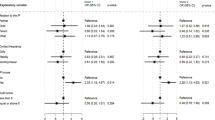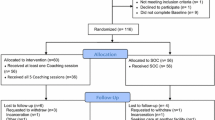Abstract
Despite the seriousness of Hepatitis C (HCV), many patients do not receive treatment. One promising means of addressing these issues for medically ill patients is through participation in support group services. This study examined individual-, treatment- and system-level factors associated with enrolling in a support group intervention (psychoeducation) for persons with HCV. A total of 235 research participants were recruited as part of a NIAAA-funded randomized clinical trial for patients with HCV and their family members, with 172 (73.2 %) agreeing to enroll in the psychoeducation trial and 63 (26.8 %) declining. Factors leading to enrollment indicated that individuals without employment, with certain personality structures (low cooperativeness and self-directedness), and traveling greater distance to their group were more likely to agree to participate. Populations being seen in public settings demonstrate a desire for additional support and education, but at the same time these potential participants are faced with challenges to following through and enrolling in the desired services.
Similar content being viewed by others
References
Alter, M. J., Kruszon-Moran, D., Nainan, O. V., McQuillan, G. M., Gao, F., Moyer, L. A., … Margolis, H. S. (1999). The prevalence of hepatitis C virus infection in the United States, 1988 through 1994. North England Journal of Medicine, 341, 556–562.
Bauman, L. J., Gervey, R., & Siegel, K. (1992). Factors associated with cancer patients’ participation in support groups. Journal of Psychosocial Oncology, 10, 1–20.
Beadle, J. N., Brown, V., Keady, B., Tranel, D., & Paradiso, S. (2012). Trait empathy as a predictor of individual differences in perceived loneliness. Psychological Reports, 110, 3–15.
Cameron, L. D., Booth, R. J., Schilatter, M., Ziginskas, D., Harman, J. E., & Benson, S. (2005). Cognitive and affective determinants of decisions to attend a group psychosocial support program for women with breast cancer. Psychosomatic Medicine, 67, 584–589. doi:10.1097/01.psy.0000170834.54970.f5.
Cloninger, C. R. (1987). A systematic method for clinical description and classification of personality variants. A proposal. Archives of General Psychiatry, 44, 573–588.
Cloninger, C. R., Svrakic, D. M., & Przybeck, T. R. (1993). A psychobiological model of temperament and character. Archives of General Psychiatry, 50, 975–990.
Cloninger, C. R., & Zohar, A. H. (2011). Personality and the perception of health and happiness. Journal of Affective Disorders, 128, 24–32.
Fassino, S., Abbate-Daga, G., Piero, A., Leombruni, P., & Rovera, G. G. (2003). Dropout from brief psychotherapy within a combination treatment in bulimia nervosa: Role of personality and anger. Psychotherapy Psychosomatics, 72, 203–210.
Ho, S. B., Groessl, E., Dollarhide, A., Robinson, S., Kravetz, D., & Dieperink, E. (2008). Management of chronic hepatitis C in veterans: The potential of integrated care models. American Journal of Gastroenterology, 103, 1810–1823.
Josefsson, K., Cloninger, C. R., Hintsanen, M., Jokela, M., Pulkki-Råback, L., & Keltikangas-Järvinen, L. (2011). Associations of personality profiles with various aspects of well-being: A population-based study. Journal of Affective Disorders, 133, 265–273.
Katz, D., Koppie, T. M., Wu, D., Meng, M. V., Grossfeld, G. D., Sadesky, N., et al. (2002). Socio-demographic characteristics and health related quality of life in men attending prostate cancer support groups. Journal of Urology, 168, 2092–2096.
Leombruni, P., Fassino, S., Picardi, A., & Morosini, P. (2005). Association between low self-directedness and poor adherence to antiretroviral treatment in patients with recent diagnosis of HIV infection. Journal of Psychosomatic Research, 59, 113–114.
Mongini, F., Fassino, S., Rota, E., Deregibus, A., Levi, M., Monticone, D., et al. (2005). The Temperament and Character Inventory in women with migraine. Journal of Headache Pain, 6, 247–249.
National Institutes of Health. (2002). National Institutes of Health Consensus Development Conference statement: Management of Hepatitis C, June 10–12, 2002. Hepatology, 36, S3–S20.
North, C. S., Pollio, D. E., Sachar, B., Hong, B., Isenberg, K., & Bufe, G. (1998). The family as caregiver for schizophrenia: A group psychoeducation model. American Journal of Orthopsychiatry, 68, 39–47.
Partnership Steering Committee. Special Projects of National Significance Program. (2000). Partnership steering committee local evaluation plans. The Evaluation and Technical Assistance Center (ETAC), Mailman School of Public Health, Columbia University, New York, NY. Retrieved www.TheMeasurementGroup.com. Accessed June 2012.
Pollio, D. E., North, C. S., Hudson, A. M., Hong, B. A., Osborne, V. A., & McClendon, J. B. (2012). Psychoeducation responsive to family (PERF): Translation of a multifamily group model. Psychiatric Annals, 42, 212–235.
Pollio, D. E., North, C. S., & Osborne, V. (2002). Family-responsive psychoeducation groups for families with an adult member with mental illness: Pilot results. Community Mental Health Journal, 38, 413–421.
Sherman, M. D., Fischer, E., Bowling, U. B., Dixon, L., Ridener, L., & Harrison, D. (2009). A new engagement strategy in a VA-based family psychoeducation program. Psychiatric Services, 60, 254–257.
Sherman, A. C., Pennington, J., Simonton, S., Latif, U., Arent, L., & Farley, H. (2008). Determinants of participation in cancer support groups: The role of health beliefs. International Journal of Behavioral Medicine, 15, 92–100.
Svrakic, D. M., Whitehead, C., Przybeck, T. R., & Cloninger, C. R. (1993). Differential diagnosis of personality disorders by the seven-factor model of temperament and character. Archives of General Psychiatry, 50, 991–999.
Taylor, S. E., Falke, R. L., Shoptaw, S. J., & Lichtman, R. R. (1986). Social support, support groups, and the cancer patients. Journal of Consulting and Clinical Psychology, 54, 608–615.
Voerman, B., Visser, A., Fischer, M., Garssen, B., van Andel, G., & Bensing, J. (2007). Determinants of participation in social support groups for prostate cancer patients. Psycho-Oncology, 16, 1092–1099.
Wachtel, T., Piette, J., Mor, V., Stein, M., Fleishman, J., & Carpenter, C. (1992). Quality of life in persons with human immunodeficiency virus infection: Measurement by the Medical Outcomes Study instrument. Annals of Internal Medicine, 116, 129–137.
Walch, E. S., Roetzer, M., & Minnett, T. A. (2006). Support group participation among persons with HIV: Demographic characteristics and perceived barriers. AIDS Care, 18, 284–289.
Williams, L., & Wingate, A. (2012). Type D personality, physical symptoms and subjective stress: The mediating effects of coping and social support. Psychology and Health, 27, 1075–1085.
Acknowledgments
This research was supported by the National Institute on Alcohol Abuse and Alcoholism, grant RO1-015201 to Dr. North. Points of view in this document are those of the authors and do not necessarily represent the official position of NIAAA, the Department of Veterans Affairs, or the U.S. Government.
Disclosures
Dr. North discloses employment by VA North Texas Health Care System, Dallas, TX, USA. Dr. North also discloses research support from NIAAA, NIDDK, the Department of Veterans Affairs, the American Psychiatric Association, and the Orthopaedic Trauma Association, consultant fees from the University of Oklahoma Health Sciences Center and from the Tarrant County, TX Department of Health, and speaker’s fees from the Pueblo City/County, CO Department of Health.
Author information
Authors and Affiliations
Corresponding author
Rights and permissions
About this article
Cite this article
Pollio, D.E., North, C.S., Hudson, A.M. et al. A Comparison of Enrollees Versus Non-enrollees in a Patient/Family HCV Psychoeducation Study. J Clin Psychol Med Settings 20, 156–163 (2013). https://doi.org/10.1007/s10880-012-9332-1
Published:
Issue Date:
DOI: https://doi.org/10.1007/s10880-012-9332-1




